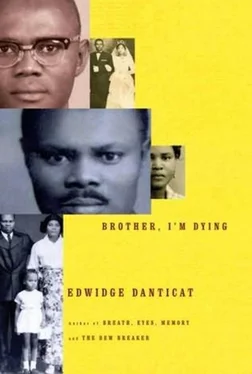“So began a conversation between Denise and me,” my uncle later told me. “Every time I went by afterwards on my way to the market, I had to see her. We talked and talked for a few months and then we took action.”
The action was to notify their families at the beginning of 1947 that they were moving to the capital together. The oldest of his sisters, my aunt Ino, was already living in Bel Air, a hilltop neighborhood overlooking Port-au-Prince harbor, and they decided to settle there.
Though they did not marry, they bought a plot of land together and built a three-room cement house, topped by a corrugated-metal roof. The house had a large front gallery that extended into the alley that curved toward the main road, Rue Tirremasse. The entire house was painted salmon pink, both inside and out, except for the floors, which were covered with terra-cotta clay tiles.
The hill in Bel Air on which the house was built had been the site of a famous battle between mulatto abolitionists and French colonists who’d controlled most of the island since 1697 and had imported black Africans to labor on coffee and sugar plantations as slaves. A century later, slaves and mulattoes joined together to drive the French out, and on January 1, 1804, formed the Republic of Haiti.
More than a century later, as World War I dawned and the French, British and Germans, who controlled Haiti’s international shipping, rallied their gunboats to protect their interests, President Woodrow Wilson, whose interests included, among others, the United Fruit Company and 40 percent of the stock of the Haitian national bank, ordered an invasion. When the U.S. Marines landed in Haiti in July 1915 for what would become a nineteen-year occupation, Haitian guerrilla fighters, called Cacos, organized attacks against the U.S. forces from Bel Air. Bel Air also boasted one of Haiti’s oldest and most beautiful cathedrals, as well as one of the island’s best public schools for boys, the Lycée Pétion, which was named after Alexandre Pétion, one of the leaders in the battle for independence from the French and a mentor to Venezuela’s Simón Bolívar.
When he first moved to Bel Air, my uncle got a job working as a salesman for a Syrian émigré in a fabric shop in downtown Port-au-Prince. There he befriended a fellow salesman, a Cuban émigré named Guillermo Hernandez, who quickly became his best friend. A few months later, my father, then twelve years old, left Beauséjour and moved to the capital to attend school there. My aunts Zi and Tina and Uncle Franck later joined them, along with my grandparents, Granpè Nozial and Granmè Lorvana, who went to live with Tante Ino, the eldest daughter. Encouraged by my uncle, nearly everyone they knew was now living in Bel Air. He and Tante Denise kept adding to the house until it had six bedrooms, still pink. So when their son, Maxo, was born in 1948 there was room for him. And in 1952 there was also room when the Haitian wife of Guillermo Hernandez, his Cuban friend, died, leaving Guillermo with a six-month-old baby to raise alone. It was Guillermo who asked my uncle and Tante Denise to take in his daughter, Marie Micheline, so he could travel back home to Cuba for a visit, a trip from which he never returned.
Uncle Joseph’s hero in the 1950s was a politician named Daniel Fignolé. Uncle Joseph liked to recount how as a young legislator, Fignolé went to the public hospital in Port-au-Prince, and finding poor patients lying on the floor while the rich patients recovered in beds, he forced the rich off the beds and gave them to the poor. Soon after my uncle moved to Bel Air, Fignolé started the Laborers and Peasants Party (Mouvement Ouvriers-Paysans), which my uncle joined. For years, he and Tante Denise opened their house to Fignolé sympathizers for regular meetings, which were lively affairs with plenty of homemade liquor-kleren-and food prepared by Tante Denise, who everyone in their circle agreed was one of the best cooks in Bel Air. When it came time to address the fifty or so people who’d gathered in his pink living room, kept sparsely furnished to fit in the largest possible number of Fignolists, who often brought their own chairs with them, he would model Fignolé’s forceful and direct Creole diction and speak in a clear, powerful bass, allowing only a few well-chosen pauses.
“We have struggled since we became an independent nation in 1804,” my uncle recalled saying. “Certain people think that in order for the country to progress, only the rich minority need succeed. This country cannot move forward without the majority. Without us.”
Hardly earth-shattering, but he considered himself more of a disciple than a chief. All he had to do was echo one of Fignolé’s favorite phrases to get applause.
In his speeches to the group, my uncle sometimes evoked his father, Granpè Nozial, who’d joined the guerrilla resistance against the U.S. invasion and who was often away from home fighting a battle he did his best to keep from reaching his young children. Granpè Nozial would leave my uncle, the oldest, though still a child himself, the task of looking after his mother and siblings for weeks and months at a time. Each time his father left for a campaign, my uncle worried that, like the thousands of Haitian guerrilla fighters who were killed by the Americans and whose corpses were dumped in roads and public parks to discourage others, his father might never come back.
“The men of my father’s generation fought with all their might,” my uncle would declare in a carefully modulated voice as he addressed the Fignolists who’d crowded into his living room, including his father, Granpè Nozial, who, now widowed and looking older than his sixty-five years, sat stoop-shouldered, his once sinewy body beaten and worn, his head bouncing back and forth as he dozed off in the front row.
“But mostly,” my uncle continued, “these men used their hands and old-fashioned weapons. They used old Krags, slingshots, machetes and spears. They used whatever weapons they could muster up or create. Now we want to fight for progress. We want to fight with our minds. This is where real power lies.”
At that time, the president of Haiti was Paul Magloire, an army general who’d unseated two of his predecessors. Nicknamed Kanson Fé, or Iron Pants, because of a speech he had given in which he’d declared that he must put on “iron pants” to deal with troublemakers, he had graced the February 22, 1954, cover of Time magazine dressed in full golden military regalia over a caption that read: “HAITI’S PRESIDENT PAUL MAGLOIRE. His Black Magic: roads, dams, schools.”
In 1956 Magloire stepped down after a national strike over, among other things, increased dissatisfaction with his extravagant spending. In addition to roads, dams, and schools, it turned out, he spent lots of money on lavish parties, state visits and costly reenactments of famous Haitian battles, mostly to amuse himself and a small circle of likeminded friends. Fignolé was one of many in a slippery line of succession who would eventually replace him. On May 25, 1957, as Fignolé was sworn into office, my uncle and father were part of the massive crowd that dashed to the national palace to dance in celebration. However, after only nineteen days, Fignolé was deposed by the army and forced into exile. François “Papa Doc” Duvalier then assumed the presidency. Tante Denise woke up the next morning to find Uncle Joseph sobbing in their bed. (My father, then twenty-two years old, has no recollection of his own reaction to all this, only of my uncle’s, which was “sad”.)
Before Fignolé’s fall, my uncle had briefly contemplated running for political office, either as a deputy from Bel Air or as mayor of Port-au-Prince. After Fignolé’s ouster, he realized how precarious political power could be and abandoned all notions of being part of it.
Читать дальше












